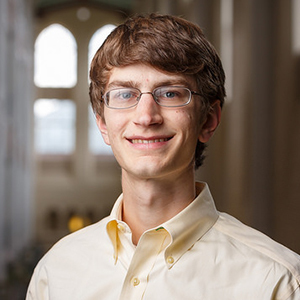Clay Becker (ND Class of 2017)

My undergraduate experience at Notre Dame was defined by opportunities. As a biology student interested in research, I was fortunate to have the opportunity to join Dr. David Hyde’s lab and perform research on retinal regeneration in zebrafish. In this lab, I gained skills that would form the foundation for my scientific career; some of these skills were basic, such as methodology and experimental design, but far more important were the more intangible skills of perseverance, flexibility, and independence. My time in the Hyde lab provided crucial lessons that the nature of scientific inquiry leads to failure as well as success, and that the key to productive research is to take each failure as a learning opportunity and keep your mind open to the implications of your data. Most importantly, the Hyde lab fostered my independence by giving me the opportunity to pursue my own project as an undergraduate, an experience which I now fully appreciate as a unique part of the Notre Dame experience.
As an undergraduate researcher at Notre Dame, I experienced firsthand the importance of basic science. I was engaged not only in my own research project, but also in dialogue with the greater scientific community. I had the opportunity to present my work at Notre Dame-specific symposiums as well as a regional Society for Developmental Biology conference. Being exposed to research from many disciplines and in many models impressed upon me the importance of basic scientific research, and how it is able to drive relevant clinical applications. Notre Dame is a collaborative environment where open scientific dialogue is facilitated and encouraged. I chose to pursue my Ph.D at Duke University in the Developmental and Stem Cell Biology (DSCB) program, as it exemplifies these same aspects of collaboration and basic scientific discoveries driving clinical applications.
The DSCB program emphasizes training in developmental biology as well as cell biology, molecular biology, and genetics. Following my interest and experience with regeneration, I joined Ken Poss’s lab at Duke and am studying the regulation and initiation of spinal cord regeneration in zebrafish. Dr. Poss’s lab uses the zebrafish as a model system for studying regeneration of many tissues, including the heart, fin, scale, and skin. The lab’s focus on basic science of regeneration and collaboration with other labs around campus made it a perfect fit for the research philosophy I developed as an undergraduate. The training I received as an undergraduate made it possible for me to make immediate progress on my project; my experience with running an independent project helped me to develop a cohesive project plan for my Ph.D, and my technical experience helped me to quickly begin gathering data and establish new methods that I am using in my project.
My research experience as an undergraduate was instrumental to the success I have been having in graduate school so far. The emphasis that Notre Dame places on undergraduate opportunities is truly unique, and has contributed significantly to my development as a scientist. I plan to earn my Ph.D from Duke University and continue to perform research into fundamental questions underlying regeneration as a PI.